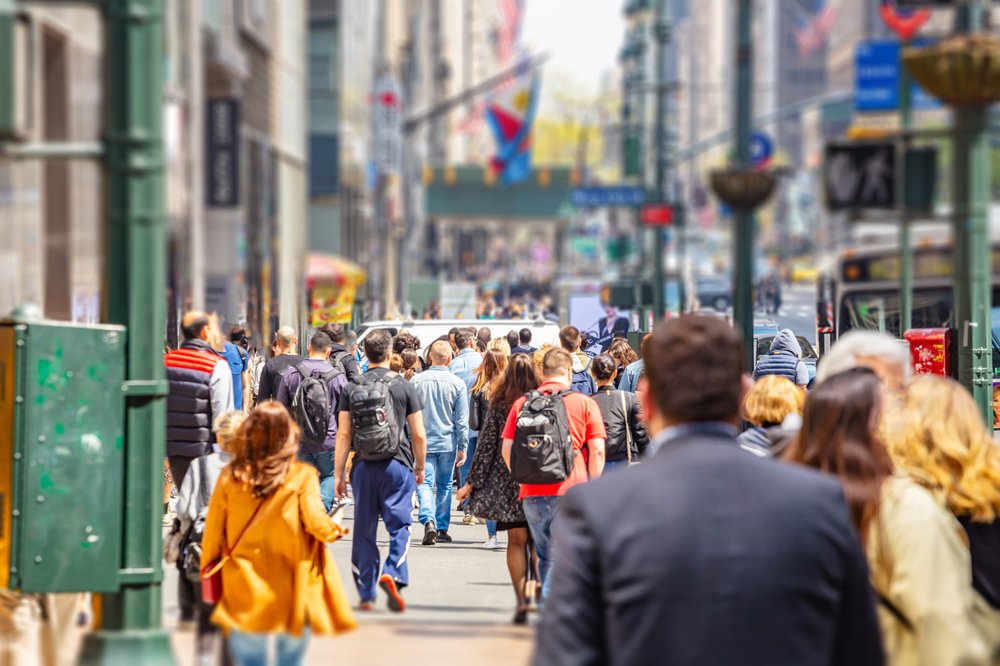NYC could lose 71K jobs due to Trump's tariffs. That's the good news, report says.
April 17, 2025, 10 a.m.
The projected job losses would be even steeper in a severe recession, the city comptroller says.

New York City risks losing tens of thousands of jobs if new tariffs imposed by the Trump administration remain in place, according to an analysis by city Comptroller Brad Lander.
The city could lose 150,000 jobs in a “severe recession” generated by the tariffs and see $10 billion in lost tax revenues, according to the new analysis released Wednesday.
The likelier scenario, Lander said, is a “mild recession” during which the city loses 71,200 jobs “from peak to trough.” That includes 35,700 job losses by the end of 2025, and $4.3 billion in lost revenues over the next two fiscal years.
The differing scenarios, he said, depend on the duration and extent of the tariffs, which have widely varied.
“The last two weeks of Trump’s erratic economic policy making has brought chaos to global markets,” Lander, a Democrat, said at a press conference.
He added that the policies “dramatically increase the likelihood of a recession that would have impact on the global economy, on Wall Street, on Main Street, on New York City and on New York City’s budget.”
The Trump administration has defended the tariffs, arguing in an April 15 White House fact sheet that they were imposed “on nations with which the U.S. has the largest trade deficits in order to level the playing field and protect America’s national security.”
Lander urged members of the City Council to significantly shore up the city’s rainy-day fund in anticipation of a recession, and said Mayor Eric Adams' administration “has not taken any steps to address the economic and fiscal impacts of Trump administration policies on New York City.”
Kayla Mamelak Altus, a City Hall spokesperson, dismissed Lander's criticism.
“This all screams of hypocrisy – (City Council Speaker) Adrienne Adams and Brad Lander have repeatedly criticized Mayor Adams for increasing the money in our reserves to a record level. Now, they’re saying we should put more money in the reserves while still spending unprecedented dollars on numerous programs. Where do they suggest this money comes from?"
She added: "We use facts to shift budget policy, not political headwinds or premature predictors. We will continue to carefully monitor these recent developments and will reflect the impact, if any, on the city budget in our revenue forecast updates, reflecting our commitment to effectively protecting the city’s fiscal health.”
Last week, Speaker Adams and other elected officials called on Republican members of the city’s congressional delegation to “protect the city” from the impact of the tariffs, which they argued “will effectively serve as the largest tax increase in the U.S. since 1968.”
“If Trump’s tariffs go into effect, they will threaten our city and county, and working people will see prices skyrocket for groceries, electronics, and other goods while losing their jobs,” the speaker said in a statement.
Councilmember Justin Brannan, chair of the committee on finance, joined Adams in the statement, arguing that “a recession is still very much on the table” in part because of losses on Wall Street.
“When Wall Street stumbles, New York City feels it. That’s the revenue we rely on to pay teachers, fund public safety, and deliver basic services,” Brannan said in a statement.
The comptroller’s “mild recession” analysis projected that tariffs would remain in place until 2026, causing GDP to decline by 1% by the end of 2025 from its first quarter peak and the S&P 500 to experience a 20% decline from the end of 2024 to the end of 2025.
“As we write, a mild recession appears to be reasonably close to a new baseline,” the report stated.
The worst-hit sectors of the city’s economy would be leisure and hospitality, which the report estimated would experience a 6% decline in a mild recession, followed by manufacturing and retail trade. Already, the report claimed, the city had seen early signs of impact on the tourism industry from its top groups of international visitors.
“Canada, the U.K. and a number of European countries have issued travel advisories and warnings about visiting the U.S., and there are indications that bookings from Europe and visitations from Canada have already fallen noticeably,” it read.
This article was updated with comment from a City Hall spokesperson.
The economic outlook for NYC in ‘25? Trump-driven uncertainty is the word. Vehicle traffic is down in Manhattan, but pedestrian traffic is up, data says Thanks, office workers: Foot traffic in Manhattan nears pre-COVID levels, report says ‘Doom loop’ professor says things are actually looking up for New York City